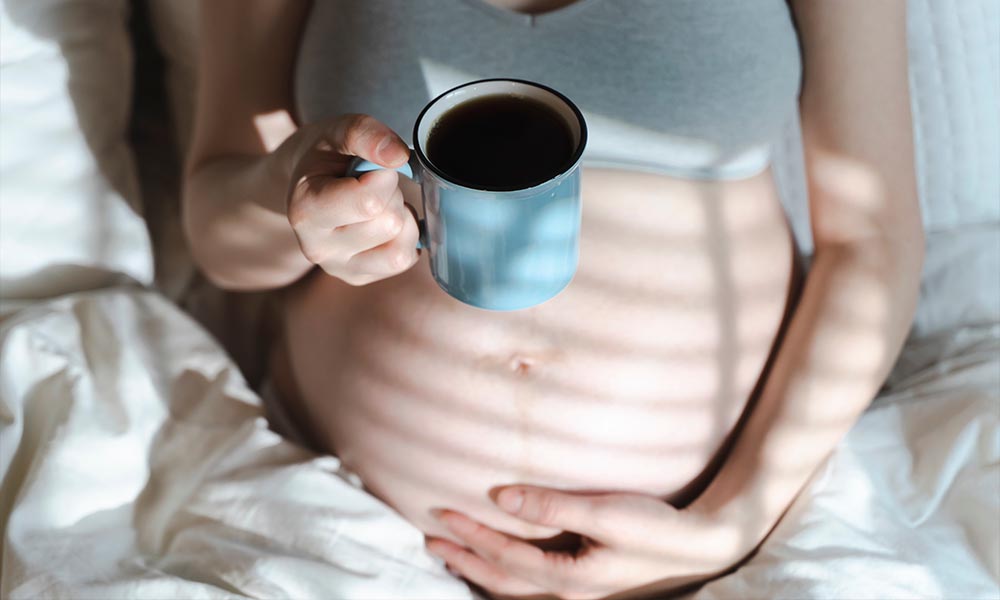
Brazil
Decaf swisswater


During pregnancy, every choice linked to diet and lifestyle takes on special significance. Among common habits, drinking coffee while pregnant is often the subject of questions and doubts. Can you drink coffee in pregnancy? In what amounts is it considered safe? Scientific recommendations suggest a cautious approach, but not necessarily cutting out caffeine altogether. What matters is understanding the role this substance can play in the mother’s body and in the foetus’s development, so that you can make informed decisions.
Caffeine is a natural stimulant found not only in coffee but also in tea, chocolate, energy drinks and certain medicines. During pregnancy, caffeine metabolism slows down: an expectant mother’s liver takes longer to process it, and this clearance time increases as pregnancy progresses. In addition, caffeine can cross the placenta and reach the foetus directly, and the foetal system is not yet able to metabolise it efficiently. This has raised concerns within the scientific community about possible effects on neurological development and birth weight.
Care is also needed with coffee consumption while breastfeeding. The caffeine a mother consumes passes into breast milk in small amounts, peaking at about an hour after intake. Although most infants tolerate moderate amounts well, excessive exposure may lead to irritability, sleep difficulties or restlessness. Major international guidelines—including those from the American Academy of Pediatrics and EFSA (the European Food Safety Authority), suggest an upper limit of 200–300 mg of caffeine per day, roughly equivalent to two or three small cups of espresso. It’s important to observe your baby’s behaviour: if they show signs of discomfort, it may help to cut back further or adjust the timing of your coffee, avoiding the period immediately before a feed. Coffee is not off-limits during breastfeeding, but, as in pregnancy, it should be enjoyed with moderation and a sense of responsibility.

The World Health Organization (WHO) and numerous health bodies, including EFSA (the European Food Safety Authority), agree on what is considered a safe limit: 200 milligrams of caffeine per day during pregnancy. This is roughly equivalent to one or two small cups of espresso, depending on how it’s prepared and the coffee variety. Exceeding this threshold may increase the risk of adverse outcomes such as miscarriage, preterm birth and low birth weight. That said, individual responses to caffeine vary from one woman to another, so it’s always wise to discuss your intake with your doctor or midwife. Decaffeinated coffee is an option worth considering if you’d like to reduce caffeine further without giving up the pleasure of a sip.
Several studies have explored the impact of caffeine during pregnancy. Research published in the British Medical Journal noted an association between high caffeine consumption and reduced birth weight, while an analysis from the University of Reykjavik found a higher incidence of sleep disturbances in children whose mothers had consumed high doses of caffeine. However, these findings need to be interpreted with caution: many studies show correlation, but not always a clear cause-and-effect relationship. Even so, the precautionary principle favours avoiding excess. It’s always advisable to seek medical guidance on diet during pregnancy, especially if you have underlying health conditions. Doctors are the professionals best placed to advise for or against caffeine use in pregnancy.
When kept within recommended limits, good-quality coffee blends can still offer certain benefits in pregnancy. The stimulating effect of caffeine can help counter the drowsiness and fatigue that are common in the first trimester. For many women, it also represents a small ritual of pleasure and normality in a time of major change. You can choose lower-caffeine alternatives while still keeping the everyday social gesture of a coffee break alive.
Drinking coffee in pregnancy and while breastfeeding isn’t forbidden, but it does need to be done with care and awareness. Moderate caffeine consumption—within the amounts indicated by scientific bodies—is generally considered safe. Nevertheless, every pregnancy is unique and may involve different needs. For this reason, it’s always best to discuss the matter with your doctor or obstetrician, and to avoid decisions based on unverified information. Maternal and infant health also depend on informed dietary choices, and—managed with balance—coffee can safely remain part of daily life for many mums-to-be.